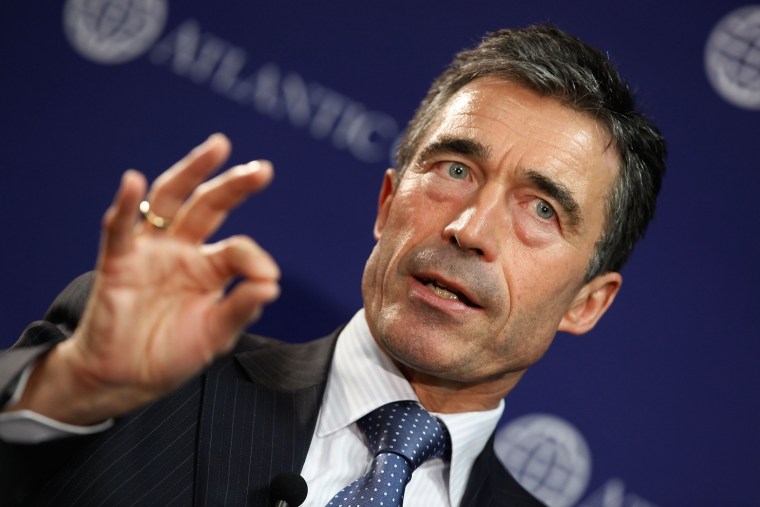NATO's secretary-general said Tuesday that President Barack Obama is right to decide "strategy first and then resources" for Afghanistan.
Anders Fogh Rasmussen, chief of the North Atlantic Treaty Organization, and Obama spoke to reporters Tuesday after a meeting in the White House. Rasmussen said he and other U.S. allies in NATO are examining an on-the-ground assessment from the U.S. and NATO commander in Afghanistan, Gen. Stanley McChrystal. Among other things, McChrystal calls for more combat troops.
But Rasmussen also said that leaders have an obligation to think about more than just that. He said "the first thing is not numbers."
In earlier discussions, Rasmussen stopped short of calling for more combat troops to be sent to Afghanistan, as the Obama administration currently is debating.
Instead, Rasmussen said Monday that a far stronger focus needs to be put on preparing Afghan military and civilian forces to take the lead in securing and building their nation. Rasmussen also voiced doubts that the United States and NATO will be successful in preventing the Taliban and other militants from again making Afghanistan a haven for terrorists.
"Despite everything that we have already done, reaching our goal in Afghanistan is not guaranteed," Rasmussen told a standing room-only audience on Monday at the Atlantic Council, a Washington think tank. "We cannot simply continue doing exactly what we are doing now. Things are going to have to change."
Further troop requests?
Speaking with reporters after his Monday speech, Rasmussen clarified that he was referring only to McChrystal's views on training Afghan forces and helping stabilize Afghanistan's government. He said it is premature to discuss whether more combat troops should be sent to Afghanistan, although he said he wants more international training forces to go.
At a secret meeting Friday in Germany, a senior military official said, McChrystal hand-delivered copies of his troop request document to the chairman of the Joint Chiefs of Staff, Adm. Mike Mullen, the head of the U.S. Central Command, Gen. David Petraeus and the NATO supreme allied commander, Adm. James Stavridis. In turn, Mullen delivered a copy of the request, which is believed to ask for as many as 40,000 U.S. troops, to Gates during the weekend, said the military official who spoke on condition of anonymity because he was not authorized to discuss the matter.
Rasmussen did not answer when asked Monday if he had seen the troop request.
The Obama administration is torn between ramping up its military strength in Afghanistan or turning to a new strategy of rooting out al-Qaida in Pakistan, mostly with unmanned spy planes and special forces units. The White House is not expected to consider McChrystal's troop request for at least two weeks until officials decide what strategy to pursue, the military official said.
Mullen and Petraeus will be part of a top-level White House meeting Wednesday with Obama that also will include Defense Secretary Robert Gates, Secretary of State Hillary Rodham Clinton and National Security Adviser James Jones.
Dwindling support for war
Noting dwindling public support for the war, Rasmussen said he wants NATO to forge a new contract with Afghanistan that promises aid only if the Kabul-based government curbs corruption and delivers basic services to the Afghan people. He urged the United Nations and other international groups to work more closely with Kabul, in part to help certify the results of the Aug. 20 elections.
The elections were marred by claims of ballot box stuffing and voter coercion, and officials now are recounting a sample of 10 percent of ballot boxes from 3,063 polling stations with suspect results. Preliminary results show Afghanistan President Hamid Karzai winning with 54.6 percent of the vote. But if enough ballots are found to be fraudulent, Karzai could dip below the 50 percent threshold needed to avoid a runoff with chief challenger Abdullah Abdullah, a former Afghan foreign minister.
If a runoff should be needed, it would have to occur in the last two weeks in October, before winter snows make much of the north impassable. Missing that window could delay any runoff until spring, creating a power vacuum in a country already struggling to fend off the resurgent Taliban and losing support from international allies.
Rasmussen said the election results could be certified by early October. Ultimately, he said, "we should let the Afghans decide whether they consider the elections to be credible or not."
Still, Rasmussen warned, "We need a credible and legitimate Afghan government. And we need to hold the Afghan government accountable to international obligations, and to legitimate expectations from the Afghan people."
In New York, Secretary of State Hillary Rodham Clinton said Karzai's government must earn the trust of the Afghan people by addressing the claims of serious fraud.
In a meeting with Afghan Foreign Minister Rangin Dadfar Spanta on the sidelines of the U.N. General Assembly, Clinton said a credible investigation into those allegations was critical to the legitimacy of the current administration and whatever government emerges, according to a senior U.S. official, who spoke on condition of anonymity to discuss the private diplomatic exchange.
More on: NATO | Afghanistan | McChrystal
